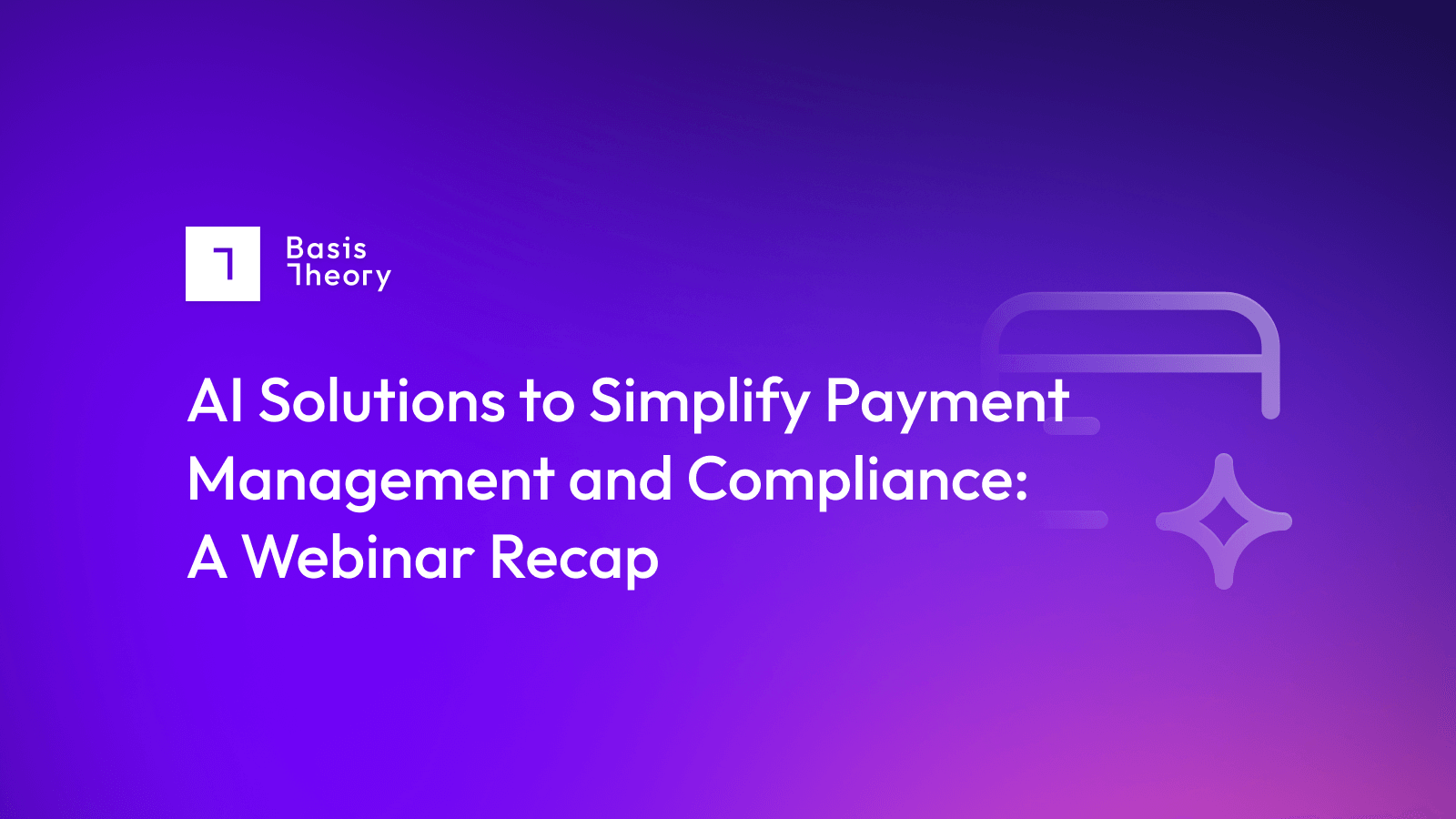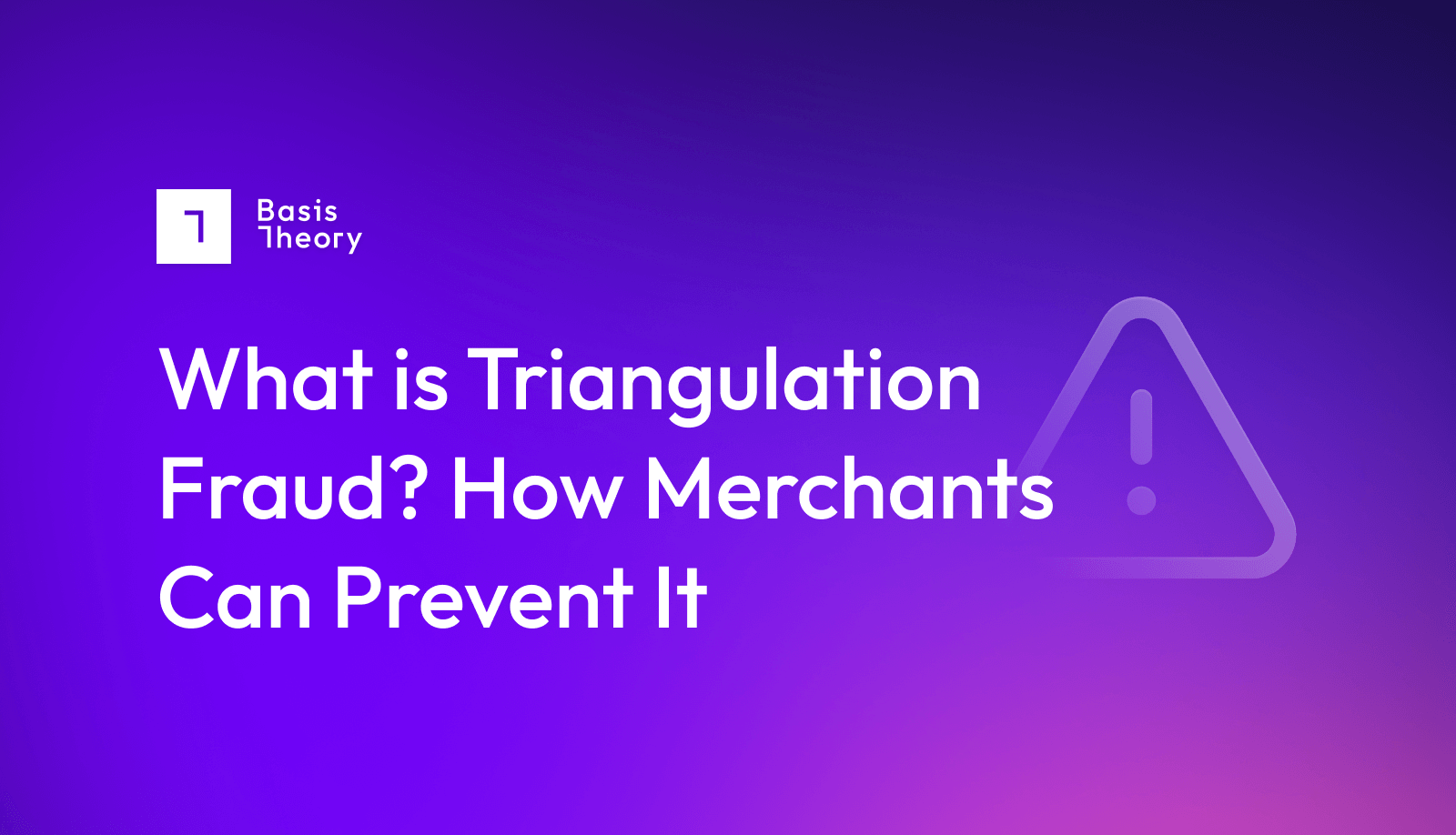AI Solutions to Simplify Payments and Compliance: A Webinar Recap

The Basis Theory team joined a webinar hosted by the Merchant Risk Council (MRC) on November 1 titled “AI Solutions to Simplify Payment Management and Compliance”.
Casey Clegg, President at Basis Theory, and Dwayne Gefferie, Founder and Principal Consultant at DataBright, provided insights into the role of AI in the payments industry and its potential to enhance security, fraud detection, and payment optimization.
Here are some of the key takeaways from the conversation.
The Current State of Artificial Intelligence (AI)
While AI is the talk of the town these days, innovation is mostly happening at the edges, especially in payments. This could be due to well-known ethical concerns of AI getting into the hands of fraudsters and giving them tools to impersonate identities or defraud systems.
However, instead of shying away from AI, this provides a great opportunity for the payments industry to stay ahead of this potential misuse.
AI has had a direct impact on businesses, but not to the level that might be depicted in movies. Companies like Google, Meta, and OpenAI are pushing the envelope and embracing AI in their day-to-day operations.
“It’s up to us as professionals, especially in the payments industry, to not be afraid of it but to embrace it, to start being as progressive as [the larger companies] have been,” Gefferie said.
AI for Compliance and Security
Broadly speaking, AI is not yet at the core of the way businesses operate in payments.
Slowly, the industry is starting to get smarter about this, but it takes data to do so, and the data needs to accumulate over time for maximum impact.
Companies like Sardine, Plaid, and Mastercard are leaning into consortiums that break down walls of data and make it easier to share across the industry. Without these intentional efforts to make data openly available, AI simply won’t be effective for security and compliance.
“As an industry, we need to be thoughtful. We should be ahead of where we need to be in terms of the security and compliance issues that we’re going to face,” Clegg said.
Fraud Detection Solutions with AI
When we as an industry collectively think of AI in payments, fraud is the first thing that comes to mind. With the mass migration of business transactions happening online, the prevalence of fraud came with it.
In fact, a recent report found that an estimated $8.8 billion is lost yearly due to fraud - primarily card-not-present fraud. This problem certainly won’t solve itself, but data can help.
Today, risk scoring and chargeback prevention are two areas where AI is really having an impact.
Risk Scoring
Companies like Kount, Forter, and Signifyd have used sophisticated data models to implement risk scoring, or the ability to look at patterns in data that can find the likelihood of a particular transaction being fraudulent. Thanks to advancements, these models are getting better and better over time. These risk scoring solutions use several hundred variables to measure against this risk score - and it is effectively preventing fraudulent transactions.
Chargeback Prevention
Risk scoring often can’t stand alone by itself, since customers are constantly traveling and using new devices for purchases. According to a study by Ethoca, chargebacks are expected to hit $337 million annually by 2026. That is why Ethoca, as well as Verifi, Accertify, and others have developed tools to help mitigate chargebacks. While these models started out simply reading data, they are starting to become more sophisticated and better at preventing chargebacks.
And, this is only the beginning. We’re seeing more dynamic 3DS solutions and dynamic captchas using neural networks and generative AI. These challenges are tougher for fraudulent parties to get through while also improving UX for legitimate consumers by being less likely to challenge or block real users.
AI for AML
Next to fraud, anti-money laundering (AML) is seeing the most disruption with AI. being disrupted the most. As payments are becoming increasingly digital, fraudsters are finding creative ways to launder money. We’re seeing instances of people using AirBNB, Facebook, TikTok, and other similar platforms to launder money, and it’s difficult to keep up with.
AML has no choice but to use AI at this point due to the massive quantity of transactions happening each day. Solutions like Feedzai, Comply Advantage, and Sentinels are key players in this space leveraging AI to prevent such illegal activities.
These tools focus primarily on detecting behavior by recognizing patterns, money flows, and detecting potential nefarious activities. The tools create alerts for compliance departments to review, but can also start to “look into” the flagged transactions and get better at detecting illegal activity before human intervention even needs to occur.
As fraudsters continue to get smarter, the best platforms will leverage collaboration and data sharing to nimbly stay ahead of the nefarious tactics.
Payment Optimization AI Solutions
Surprisingly, payment optimization is the least mature area and has the furthest way to go. Most of the “AI” tools in this space are boiled down to smart decision engines and routing.
More sophisticated solutions do use machine learning to route payments and work more closely with data points. Where we’re seeing the most disruption with AI in payment optimization is in:
- PSP and Acquiring Routing
- Payment Flagging
- Intelligent Retries
Opportunities for AI
Because of globally interconnected payments and ongoing regulatory changes, we will continue to see AI opportunities arise in the industry.
Micro-acquirers (more specialized acquirers) will continue growing in prevalence. These more niche solutions can offer newer technologies and value-added services the large acquirers simply don’t have access to.
Incumbents are already seeing this happen today - many are losing market share to micro-acquirers that adopt AI technologies for day-to-day use.
We will see such innovation here, and in many other sub-segments in just a few short years as AI sophistication improves and the services become more effective.
.png?width=365&height=122&name=BTLogo%20(1).png)




